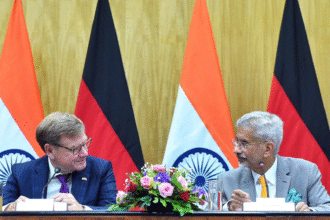NEW DELHI: The central government has confirmed the presence of a toxic industrial solvent in a cough syrup linked to the deaths of at least 11 children in Madhya Pradesh and Rajasthan prompting state authorities to halt its production and sale.
The Health Ministry verified that samples of ‘Coldrif’ cough syrup manufactured by the Tamil Nadu-based Sresan Pharmaceuticals were found to contain diethylene glycol (DEG) a poisonous chemical used in industrial applications such as antifreeze. Adding a complex layer to the investigation a ministry statement noted that the Madhya Pradesh Food and Drug Administration (MPFDA) had also analysed three of 13 samples collected locally which were initially found free of contamination.
However the definitive link was later established when Tamil Nadu’s drug regulator confirmed DEG contamination in samples taken directly from Sresan Pharma’s manufacturing site. The deaths primarily reported from the Chhindwara district of Madhya Pradesh were attributed to acute kidney failure a known effect of DEG poisoning.
This incident immediately brings to mind the heartbreaking events in The Gambia in 2022. Then over 70 children lost their lives to Indian-made cough syrups tainted with the same deadly chemical. The fact that it has happened again is raising urgent questions about the state of quality control within India’s massive pharmaceutical industry.
The tragedy began to unfold in Chhindwara where a deeply troubling pattern emerged: a series of children were dying with the same symptoms. The common thread in every case was that the children had been given Coldrif syrup for basic cold and cough ailments. As this connection became clear the Madhya Pradesh government moved decisively to impose an immediate ban on the syrup and all other products from Sresan Pharmaceuticals.
In a corresponding move the Tamil Nadu government has ordered the manufacturer to cease production of Coldrif. A nationwide recall of the product is now underway.
This isn’t the first time such an alarm has been sounded. After the 2022 deaths in The Gambia the World Health Organization (WHO) specifically warned about four cough syrups from India’s Maiden Pharmaceuticals containing “unacceptable amounts” of diethylene glycol. That history is now fueling sharp criticism with many arguing that stricter quality control measures after that first tragedy could have saved the children who died in this recent incident.
While the central government has now assembled an expert committee to probe the matter from top to bottom the action is seen by some as reactive. This episode strikes at the heart of India’s pharmaceutical sector’s identity as the “pharmacy of the world.” The nation’s standing as a top supplier of generic medicines is on the line creating immense pressure to ensure safety and efficacy. Consequently the world is now watching to see how the government will act to restore confidence.















